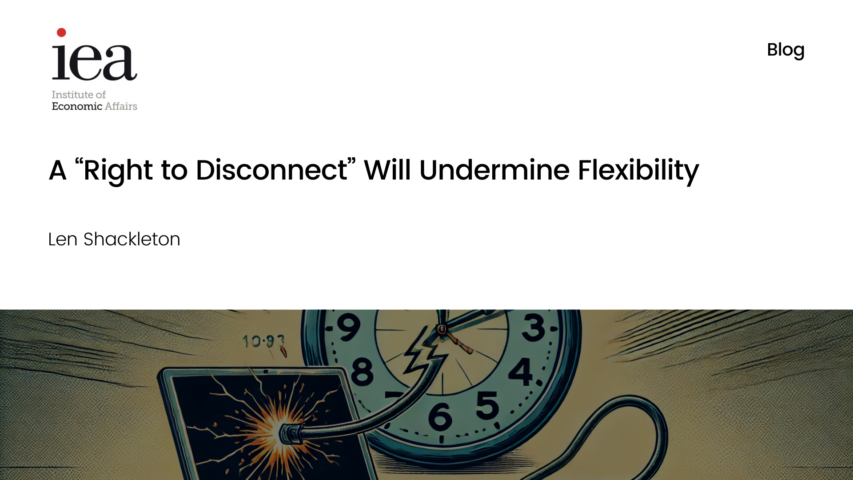A “Right to Disconnect” Will Undermine Flexibility

A “Right to Disconnect” Will Undermine Flexibility
Len Shackleton // 22 June 2021
It can be a pain when your boss rings you when you are having a TV dinner, or an important email pings on your phone on Sunday morning and has to be answered more or less immediately. But should it be against the law for employers to contact you out of working hours?
Many think so. France, Italy and Spain already have legislation: Ireland is heading in the same direction. In this country, the TUC has long advocated a ‘right to disconnect’, while a few weeks ago Prospect – a union mainly for engineer, scientists and managers – put out a report Right to disconnect: ensuring a fair work-life balance pushing for it in the context of the changing world of work post-Covid. Some activists hope that such a right could be incorporated in the Employment Bill which is in preparation at the moment.
The right to disconnect means a right for employees to switch off their laptops and phones outside working hours, and not to receive, send or answer any work-related emails, texts or phone messages. The Irish government’s proposals involve the right not to routinely perform work outside normal hours, the right not to be penalised for refusing to attend to work matters outside the working day, and the duty to respect others by not contacting them in the evening or at weekends under normal circumstances.
These rights inevitably have to be hedged around with exemptions, for smaller businesses, for companies operating across time zones, for emergency and hospital workers. They would need to allow for employees with unusual working arrangements. Unlike countries such as France, the UK has a flexible labour market with a whole host of different types of employment. Pre-Covid, four million employees worked ‘flexi-time’, two million had annualised hours contracts; neither of these groups have fixed daily hours of work. Nearly a million and a half, mainly women, had term-time only jobs. Over 100,000 had jobshares. There were 9-day fortnights, fractional hours contracts, on-call working and so on. Devising a law to cover all these possibilities, and others which innovative employers and employees might agree to in our rapidly-changing post-Covid labour market, is a difficult task. They have had problems in France with trying to pin these rights down – just as they have had with handling their famous legally-mandated 35-hour week.
A hard and fast rule would most obviously suit such undynamic forms of employment as the civil service, local government, school teaching, quangos – often heavily unionised, routine work protected from market forces. A standard day of 9 to 5, formerly carried out in large office blocks, but much of it now to be decanted into home offices.
You can see the appeal for people in this kind of job: what’s not to like? Prospect found that all age groups and voters from all political parties support the idea of a right to disconnect in principle. 53% of UK Conservative voters, for example, are in favour, with only 22% opposed.
But be careful what you wish for. All employment ‘rights’ carry costs, and employers inevitably try to pass them on to employees. There is no free lunch.
Thus, if work contact in the evenings and at weekends is forbidden, employers are going to want to be pretty damned sure you are available and fully occupied during your contracted hours. Much of the flexibility of our new ability to work at home, which has allowed us to nip out to the supermarket or to pick up the kids and make the time up later, will disappear. Employers will want to know why you have not answered that phone call or email by 5pm. Messing around on Facebook or ordering stuff from Amazon will have to wait. Stress at being contactable at all times will be replaced by new forms of stress as daytime work pressures increase. Despite Prospect’s poll, I am not sure there will be an overwhelming demand for this right when people see what it actually entails. By then, of course, it may be too late.
Our labour market is a hugely varied, diverse environment which allows for a wide range of lifestyles. There are plenty of jobs where working hours are clearly defined and involve no significant contact from employers and fellow workers outside those hours. But many people do not want to work this way: they are totally committed to their jobs and do not see an obvious break between working time and leisure.
Bankers want to make sure that the deal with Singapore is tied up however much time and however many Zoom calls it takes. Academics want to finish that important new paper they have been working on with co-authors. Creative people are working round the clock to get a new advertising campaign or TV programme or theatre production off the ground, collaborating with others all over the place. Young people in particular – usually without family responsibilities – often enjoy the buzz of long hours focusing on exciting projects.
Their employers will be faced with yet another worry to cope with. If they do not allow people to work the way they want, they may lose the benefit of their brightest and best employees, who will move elsewhere or set up on their own account. Yet if they do not insist on the rules, keen workers may trespass on other people’s time and the employer will risk ending up in a tribunal case. It may be easier to outsource jobs to freelancers, or workers in another country whose expectations are different. Or they may just be very much more selective in whom they choose to employ, which brings the risk of discrimination.
The demand for a right to disconnect is probably, like the demand for other new rights – such as the right to work at home, and a right to a four-day week – largely driven by public sector unions and the sort of bien-pensant people who always know what is good for other folks and think one size can easily be made to fit all.
Work in Britain is not the hell-hole it is often made out to be. We have a vast amount of employment legislation which means that employers who persistently mistreat and exploit their staff face legal penalties. In any case, there is a very wide range of job opportunities – even at the moment. People can vote with their feet: they do not need to stay with employers who make unreasonable demands on their time.
Bosses who are working their employees too hard will get poor results and gradually lose staff. In a competitive market they will have to change their ways or go under. That is the way the market works. We do not need yet more government interference in employment contracts at the behest of pressure groups.
This article was originally published on the IEA’s blog.
EPICENTER publications and contributions from our member think tanks are designed to promote the discussion of economic issues and the role of markets in solving economic and social problems. As with all EPICENTER publications, the views expressed here are those of the author and not EPICENTER or its member think tanks (which have no corporate view).



